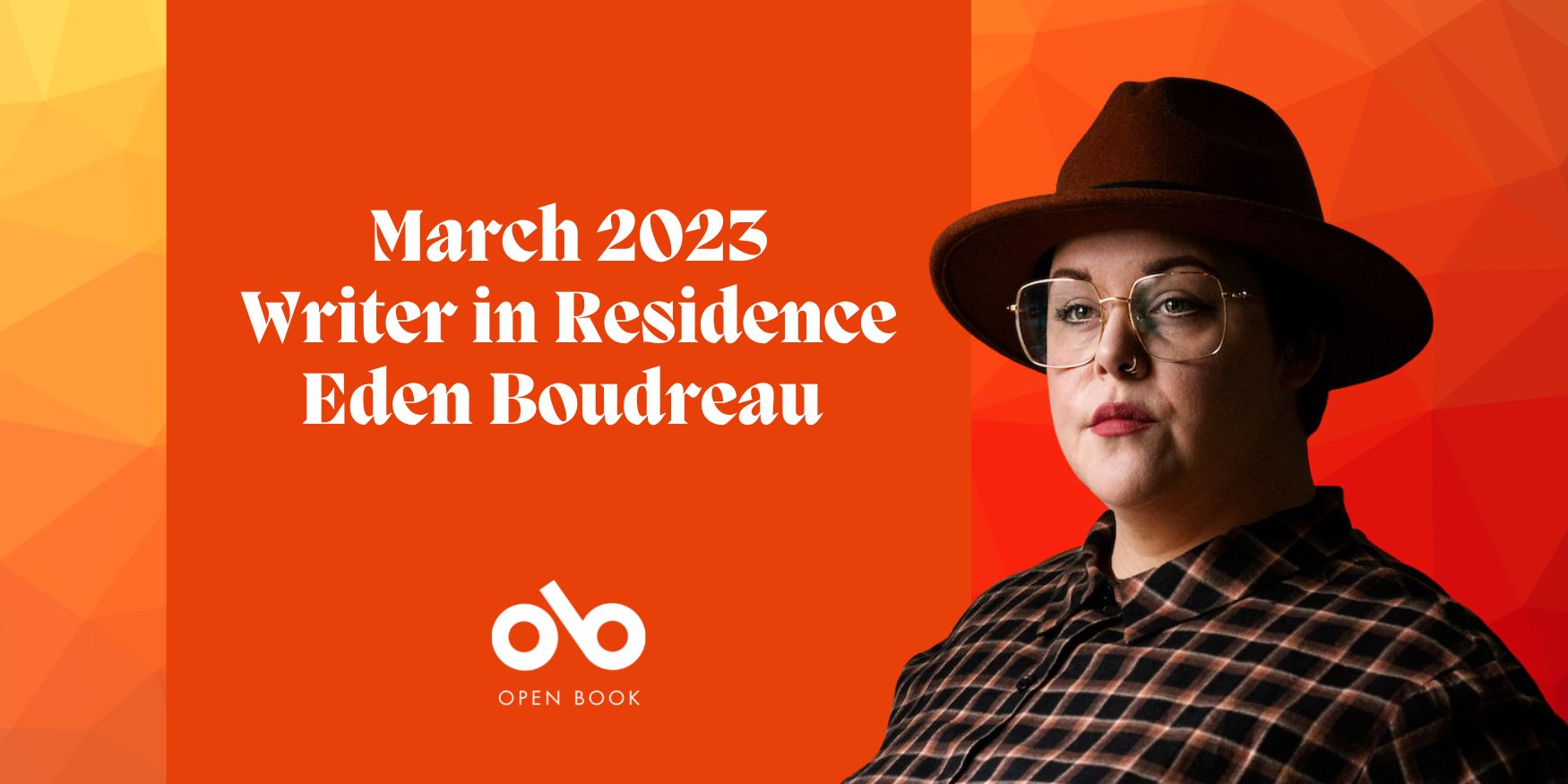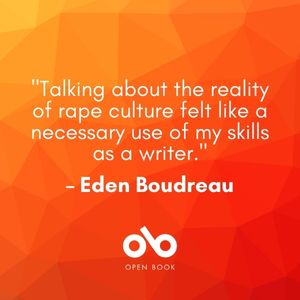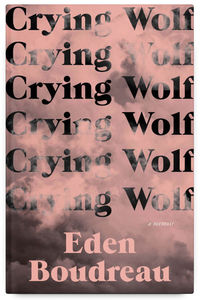March Writer in Residence Eden Boudreau Talks About Battling Rape Culture in Her Searing Memoir, Crying Wolf
It's a grim reality that women who experience sexual violence still face massive hurdles being believed and supported. When a woman deviates from the expectations of a "perfect victim"—whether in terms of class, race, sexuality, or circumstances—the barriers are even more brutal. When Eden Boudreau was attacked, she sought justice and support, but found herself denied by strangers, the justice system, and even friends, many of whom used her bisexuality and non-monogamy as excuses to silence her.
But after struggling through a period of darkness, during which she battled addiction and self-harm, Boudreau refused to be silenced, and is now telling her story in Crying Wolf (Book*hug Press). Boudreau's powerful voice takes readers on a journey that is at once deeply personal and urgently relevant to all readers. A compelling tale of survival and resilience, Crying Wolf is a equal parts healing howl and rallying call.
We're excited to announce that Eden will be joining Open Book for March 2023 as our writer in residence, sharing original writing throughout the month.
Get to know here her today as we discuss Crying Wolf. She tells us about her believe in nonfiction's unique power to "reach out and touch those readers who have felt alone", how long quiet drives have become part of her writing process, and about the specific and terrible moment (and its accompanying rage-inducing statistic) that first sparked her determination to write Crying Wolf.
Open Book:
Tell us about your new book and how it came to be. What made you passionate about the subject matter you're exploring?
Eden Boudreau:
Crying Wolf is a raw and honest memoir that shares my difficult journey to recovery after a violent sexual assault while being met with disbelief by strangers, friends, and the authorities, often as a result of stigma towards my polyamorous relationships, bisexuality, and non-traditional lifestyle. It spotlights the ways survivors are too often demonized or ignored when they belong to marginalized communities and discusses the societal conditioning of acceptable female sexuality which played a role in silencing me to the point of despair, leading to addiction and even attempted suicide.
Obviously, a large part of my passion for this subject was motivated by my need to access the deep well of emotions I was navigating during my recovery, lay them out on the page and find a way to make them beautiful. But as someone who has struggled with mental health issues her whole life as well as my fair share of brushes with sexual violence and harassment, talking about the reality of rape culture felt like a necessary use of my skills as a writer.
OB:
What do you love about writing nonfiction? What are some of the strengths of the genre, in your opinion?
EB:
Writing nonfiction is scary, but it can also be liberating. It’s an opportunity to tell your story, in your own words, through your unique lens which can be incredibly powerful and cathartic. And while it can introduce new readers to a world or experiences, they may never have gone through before, what I love the most is how it can reach out and touch those readers who have felt alone or like no one understands what they are going through.
One of the biggest strengths of the nonfiction genre is how it reaches people, how it connects communities and strangers just by using words.
Your CanLit News
Subscribe to Open Book’s newsletter to get local book events, literary content, writing tips, and more in your inbox
OB:
What do you need in order to write – in terms of space, food, rituals, writing instruments?
EB:
I have to be incredibly precious about my writing practice or I can easily get sidetracked, especially when it comes to writing the difficult stuff. Generally, I try to keep a pen and notebook close so that if I feel a bout of writer’s block coming on, I can put away the keyboard and use handwriting to unlock the parts of my creativity that might be stuck.
Also, very important to have caffeine, salty snacks, and my dog Georgia nearby in case I need to take a break for the occasional cuddle.
OB:
What do you do if you're feeling discouraged during the writing process? Do you have a method of coping with the difficult points in your projects?
EB:
When I’m feeling stuck or like I can’t move past a certain scene or point in my project, I allow myself to step away from the page. Sometimes it’s as simple as tackling another lighter scene or even going so far as to disconnect from all technology and social media, get in my car and go for a long drive.
There is something about driving and allowing your mind to wander that really helps to revive my creativity. Some of my best ideas have just popped into my head during long drives!
OB:
Do you remember the first moment you began to consider writing this book? Was there an inciting incident that kicked off the process for you?
EB:
I do.
I was sitting on my back porch after having a really gut-wrenching conversation with a detective about my options when it came to reporting my sexual assault. In no uncertain words, I was told there was only a 4% chance of ever seeing the inside of a courtroom or receiving justice through the Canadian court system. It was overwhelming and would inevitably send me into a downward spiral that I, thankfully, was able to pull out of.
But it also made me realise that if something so truly awful had to happen to me, then the only way I would survive it, would be if I could make it mean something. And writing my memoir was that something.
OB:
What are you working on now?
EB:
Currently I am working on a novel, again somewhat inspired by my own experiences and family, that delves into the generational trauma passed down from mothers to daughters when mental health issues go undiagnosed and ignored. I hope to shine a light on the generation of parentified children who have to champion for not only their own mental health but that of their loved ones and how brutal it can be for those relationships.
______________________________________
Eden Boudreau, (she/her) a lifelong maritimer, relocated from Halifax, NS to southern Ontario in 2016 with her family. It was at this time when she decided to finally pursue her dream of becoming a published author. Using her own life experiences as a bisexual, polyamorous woman who has survived her fair share of adversity as inspiration, Eden’s essays have been published in major publications such as Flare, Today’s Parent, and Runner’s World Magazine. As someone who has openly battled mental health issues, Eden was inspired during the isolation of the pandemic to launch her own podcast, Dear Lonely Writer, a show that interviews best selling authors from around the world and discusses the emotional labour that often comes with the writing process – before, during and even after the book deal.
Her debut memoir, Crying Wolf, from Book*Hug Press arrives on shelves March 22, 2023, which follows her difficult road to recovery after a violent sexual assault, with disbelievers at every turn due in part to her non-traditional lifestyle. In her (minimal) free time, Eden spends it with her three sons, menageries of pets – including a duck named Dave – at their home in Georgina, ON.





